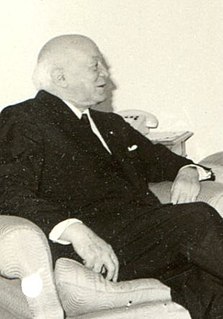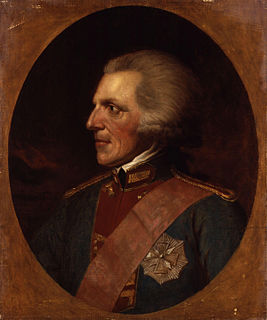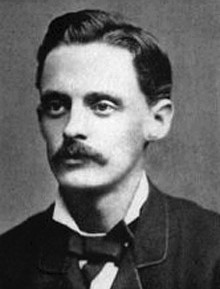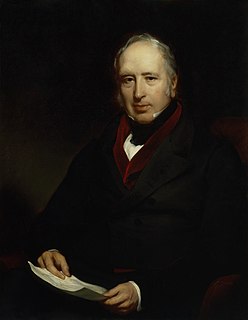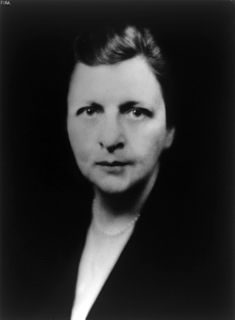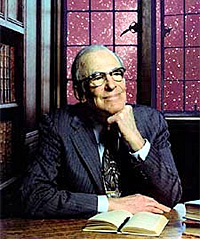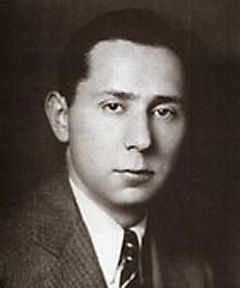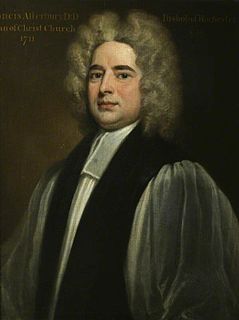A Quote by Waldemar Kaempffert
It may be that the invention of the aeroplane flying-machine will be deemed to have been of less material value to the world than the discovery of Bessemer and open-hearth steel, or the perfection of the telegraph, or the introduction of new and more scientific methods in the management of our great industrial works. To us, however, the conquest of the air, to use a hackneyed phrase, is a technical triumph so dramatic and so amazing that it overshadows in importance every feat that the inventor has accomplished.
Quote Topics
Accomplished
Air
Amazing
Been
Conquest
Deemed
Discovery
Dramatic
Every
Feat
Flying
Great
Hearth
However
Importance
Industrial
Introduction
Invention
Inventor
Less
Machine
Management
Material
May
Methods
More
New
Open
Our
Perfection
Phrase
Scientific
Scientific Method
Steel
Technical
Telegraph
Than
Triumph
Us
Use
Value
Will
Works
World
Related Quotes
Among all the marvels of modern invention, that with which I am most concerned is, of course, air transportation. Flying is perhaps the most dramatic of recent scientific attainment. In the brief span of thirty-odd years, the world has seen an inventor's dream first materialized by the Wright brothers at Kitty Hawk become an everyday actuality.
Next came the Patent laws. These began in England in 1624; and, in this country, with the adoption of our constitution. Before then [these?], any man might instantly use what another had invented; so that the inventor had no special advantage from his own invention. The patent system changed this; secured to the inventor, for a limited time, the exclusive use of his invention; and thereby added the fuel of interest to the fire of genius, in the discovery and production of new and useful things.
These airplanes we have today are no more than a perfection of a toy made of paper children use to play with. My opinion is we should search for a completely different flying machine, based on other flying principles. I consider the aircraft of the future, that which will take off vertically, fly as usual and land vertically. This flying machine should have no parts in movement. The idea came from the huge power of the cyclons
Discoveries are always accidental; and the great use of science is by investigating the nature of the effects produced by any process or contrivance, and of the causes by which they are brought about, to explain the operation and determine the precise value of every new invention. This fixes as it were the latitude and longitude of each discovery, and enables us to place it in that part of the map of human knowledge which it ought to occupy. It likewise enables us to use it in taking bearings and distances, and in shaping our course when we go in search of new discoveries.
The so-called ‘crank’ may be quite original in his ideas. … Invention, however, in the engineering sense involves originality; but not that alone, if the results are to be of value. There is imagination more or less fertile, but with it a knowledge of what has been done before, carried perhaps by the memory, together with a sense of the present or prospective needs in art or industry. Necessity is not always the mother of invention. It may be prevision.
I may be expediting the attainment of an object that will in time be found of great importance to mankind; so much so, that a new era in society will commence from the moment that aerial navigation is familiarly realised. . . . I feel perfectly confident, however, that this noble art will soon be brought home to man's convenience, and that we shall be able to transport ourselves and our families, and their goods and chattels, more securely by air than by water, and with a velocity of from 20 to 100 miles per hour.
Research is industrial prospecting. The oil prospectors use every scientific means to find new paying wells. Oil is found by each one of a number of methods. My own group of men are prospecting in a different field, using every possible scientific means. We believe there are still things left to be discovered. We have only stumbled upon a few barrels of physical laws from the great pool of knowledge. Some day we are going to hit a gusher.
Astronomy may be revolutionized more than any other field of science by observations from above the atmosphere. Study of the planets, the Sun, the stars, and the rarified matter in space should all be profoundly influenced by measurements from balloons, rockets, probes and satellites. ... In a new adventure of discovery no one can foretell what will be found, and it is probably safe to predict that the most important new discovery that will be made with flying telescopes will be quite unexpected and unforeseen.
It is my contention that an agent ideal to the use of the scientific militarist, for both the air raid and the long distance bombardment is now in the process of development; that its eventual perfection is but a matter of time; and its use in warfare is certain to occur. I refer to the rocket. The perfection of the rocket in my opinion will give to future warfare the horror unknown in previous conflicts and will make possible destruction of nations, in a cool, passionless and scientific fashion.
Modesty teaches us to speak of the ancients with respect, especially when we are not very familiar with their works. Newton, who knew them practically by heart, had the greatest respect for them, and considered them to be men of genius and superior intelligence who had carried their discoveries in every field much further than we today suspect, judging from what remains of their writings. More ancient writings have been lost than have been preserved, and perhaps our new discoveries are of less value than those that we have lost.
...while science gives us implements to use, science alone does not determine for what ends they will be employed. Radio is an amazing invention. Yet now that it is here, one suspects that Hitler never could have consolidated his totalitarian control over Germany without its use. One never can tell what hands will reach out to lay hold on scientific gifts, or to what employment they will be put. Ever the old barbarian emerges, destructively using the new civilization.



